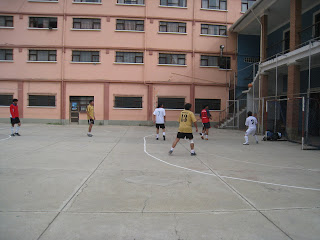
I saw both less and more of Bolivia than I saw of Argentina. I stayed for about the same amount of time in each place. In terms of things like area, distance, and number of landmarks, I certainly saw more of Argentina. I took fewer photos of Bolivia than of Argentina. On the other hand, I saw more of Bolivia in the sense of being closer to it. In Argentina, I stayed in hotels and hostels; In Bolivia, I stayed with a friend I know.
The consequence of staying with this friend is that I got to eat the things he knows and loves, and met many of the people he knows. Besides trying the local restaurants he knows and prefers, I ate many meals at his home, the same things he and his family would probably eat were I not there. For other foods, my friend knows people both in La Paz and in Coroico who sell good foods. Note I say people and not stores. We returned from Coroico and the rest of the family asked if we had eaten Doña Juana's empanadas. We had. She sells them at one corner of the main plaza in Coroico, and they are very tasty. Empanadas are bread filled with cheese and sometimes meat, and either baked or fried. They are a simple enough food, but they vary widely depending on whose hands make them and what local ingredients go in. Doña Juana seems to excel both at the blend of ingredients and at what she does with them.
A
casera is a preferred vendor. She (and they are usually women) knows you if you live there, and in exchange for your loyalty, she makes sure you get the best of the products she has to offer. In a world where many products are home grown or made by hand, this can make quite a difference. As a customer, your loyalty makes a difference to her, too. She may get quite upset and even refuse to sell to you if she hears you have been buying from her competition.
The woman in the photo is named Dora. She sells sweaters, ponchos, jackets hats, gloves, and leg warmers on a steep side street in the maze of stalls open daily in the streets of La Paz. Without following my friend, I doubt I would ever have found her booth. (I'm a poor navigator, but without following my friend, I don't know if I could even find my way back.) One of Dora's machine-made sweaters sells for about US$7. The hand-made ones sell for a little more, but not really that much more, considering how long it takes to hand knit a sweater. Hats, gloves (which unfortunately were all too large for me), leg warmers, and scarves all fetch considerably less, perhaps a dollar or two each. She also sold me a large ball of hand-spun alpaca yarn for about US$4. (A smaller, machine spun hank of alpaca yarn in the U.S. recently was priced at $30.) If these prices seem low to you, keep in mind that Dora has many neighbors who sell much the same thing. Then consider that my friend was on my case nearly every time I bought something like this for not haggling down whatever outrageous first offer was presented.
Many things in Bolivia are made and sold on a Bolivian price scale. Much food, clothing, and most basic household supplies do, in fact, cost money that is roughly in proportion to a Bolivian wage scale. Some things, such as computers and air travel, cost as much or more in Bolivia as they do in the first world, and in fact I found myself describing the experience of air travel to various people there who have never tried it.
I don't have a proper source for this figure, but my friend informed me that around 12% of the population of Bolivia has a regular job. The rest earn money at small, individual enterprises, such as Dora's sweater stand and operating the minibuses that ferry people around the city.
For readers who live in the so-called first world, please contrast the idea of a
casera with our rough equivalent: a brand name. We use a series of industrial processes (including farming and food processing) to ensure the consistency of our foods and other products. We call the sum of these processes a product, and we assign it a brand name so that we can find it again. In lieu of loyalty or personal relationships, we are guided to products claiming to be superior by product placement deals in stores or paid advertisements in weekly sales circulars that arrive whether we want them to or not. Colgate or McDonald's or Reebok may sell certain sort of "how" and perhaps a particular kind of "what" (after all, others sell toothpaste, hamburgers, and shoes), but they are anything but a "who". Can you name even the person who rang up your last purchase? Presumably, you saw him or her face to face. Almost certainly you cannot name any person involved in producing your last purchase.
So, I apologize if I troubled anyone in Bolivia by not haggling or surprised anyone by buying quite as many sweaters as I did, but Dora has a charming manner and a charming smile. Her sweaters are wonderfully warm and comfortable, and she helped me patiently to find the ones that fit me well (Bolivians are built smaller than most U.S. department stores cater to). Besides, I don't know just when I'll have the chance to come back.
Labels: Bolivia





